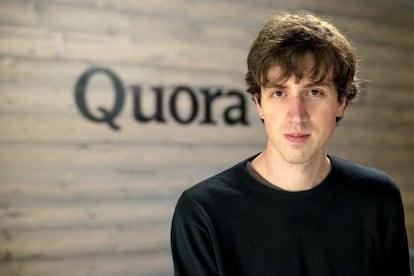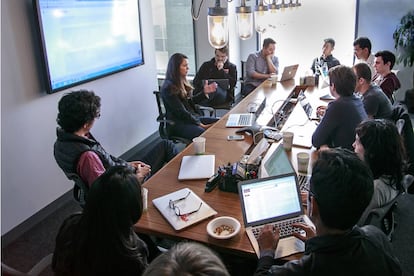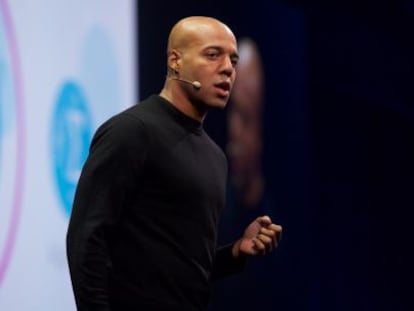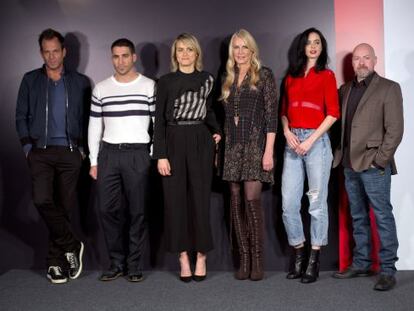Quora launches in Spanish
Adam D’Angelo, former chief technical officer at Facebook, wants to attract quality content from all over the world

Quora is one of the most specialized websites created in Silicon Valley. The 2010 brainchild of Adam D’Angelo gave up his job as chief technology officer at Facebook to create this new question-and-answer forum that has become a reference point among intellectuals, lecturers, experts and students. It barely has advertisement and generates long conversation threads that may draw the reader in for hours.
With one hundred million unique monthly visitors and 130 employees Quora is a product of the times: it started by creating content for readers to consume on desktops, and is now focusing on mobile applications. Investors have poured $150 million in a project that is said to be worth $1 billion
Question. How did you come up with Quora?
Answer. The idea had been in my mind for some time but I did not give it shape until 2010. I’ve always thought there was a lot of knowledge on the internet, but unorganized. I found a web page dedicated to analyzing Hawaii’s highway system. There is a desire to share what’s known, but no order to do it. Facebook’s wall is simple but it was not made for that. And in order to make a web page, you need some basic knowledge that is not so easily found. My wish was to create a space to share quality content.
Q. Where does the name come from?
A. From quorum. A Latin expression used in English to express agreement by the collective. We want it to be created by the group.
Q. How is it different from Yahoo! Answers?
A. We distinguish ourselves from the rest of answer services by quality. We don’t want to have repeated topics. Just one with a good conversation. We have strict guidelines and we have created a culture around its use. The most important thing is for everyone to sign up with their real name. If you have a reputation in the real world, they will believe you. And vice versa. If you make a name for yourself on the Internet, it translates to the real world. Another key is that we give full credit to the authors. We promote their contributions in the daily email and give visibility to answers that deserve it.

Q. What do you do when there is a wrong answer?
A. We don’t delete it unless it breaks the user guidelines. Whether it is an insult or plagiarism. Votes are also an indicator of quality.
Q. Don’t you think Wikipedia could have done something similar?
A. Their ambition is to be the global encyclopedia online. It’s a different concept but with some points in common. We answer questions, we look for different information but with rigor. I really appreciate the involvement of its engineers, who are very good. It’s a great project and it is not for profit.
Q. ¿Wolfram Alpha also has points in common with you?
A.That makes sense because of how accurate the answers they provide are but they are a database.
Q.Would it make sense to share your content with third parties? Let’s say Siri, Apple’s personal assistant app, uses Quora content to respond to something…
A. We don’t have specific clients or any agreement or advertisement like that.
Q. It’s interesting to note that Mark Zuckerberg is one of the users of this service…
A. In the beginning we invited our friends, who invited others and so on...I don’t know exactly how it happened but we do have quite a lot of famous people using it. Given the nature of the project it makes a lot of sense that they do.
Q. What was it like leaving Facebook?
A. I was the chief technical officer at a time when there was a lot of growth. It was a challenge and it was very beautiful but I was already going out on my own. It was not a departure from one day to the next but something that was thought through and agreed upon. I had to do it because Quora became my obsession.
Q. Many startups have problems getting funding. That is not your case. How did you do it?
A. When we went to the investors we already had the first version and a significant base of users. It would have been difficult to get money without something to show. We waited to get traction and the investors realized that there was less of a risk. Since then we’ve been lucky with the numbers.
Q. It’s strange there are so few typos on Quora.
A. That’s partly because of the kind of user we have, educated people who try to write well. It’s also in part because our system detects and corrects them. We give priority to those who have good spelling when it comes time to promote answers and the community also makes corrections.
Q. What is your business model?
A. Advertisement. Right now we’re doing some tests. Like Google, Yelp and TripAdvisor, we offer content-related advertisement. If someone is thinking of buying a car and searches for information, it is not a bad idea to put an advertisement in that topic.
Q. What topics are especially successful?
A. There’s a bit of everything but we have great conversations about how police works in different cities, what university is the best for what fields, cooking, trips, everything related to the military world. Well, there has been a lot of interest in Brexit lately.
Q. Why in Spanish now?
A. Its power is undeniable, there are more native [Spanish] speakers than English. Its growth is brutal. And we have realized that many of our users are from Hispanic countries. They looked but did not participate. We are sure they have a lot to contribute in their language.

Q. What can we find in the Spanish version?
A. Right after you register and log in for the first time, you get suggestions, a series of topics to follow. Then, it will be whatever they want it to be. Those who are already registered have the option of switching from one version to the other.
Q. What will you do to maintain the quality that you care about?
A. By betting on the content and careful moderation.
Q. Will we find translations from English?
A. At first, no. We want everything to be new, from scratch. Maybe later we’ll think about it but not right now.
Q. On August 8, Hillary Clinton will answer questions from your users in English. How did you make it happen?
A. Well, she’s campaigning and she wants to reach our public. One hundred million users is a considerable number to share her proposals with.
Q. And what if Donald Trump wanted to do the same? What would be your stance on that?
Sign up for our newsletter
EL PAÍS English Edition has launched a weekly newsletter. Sign up today to receive a selection of our best stories in your inbox every Saturday morning. For full details about how to subscribe, click here.
A. We may like him more or less but as a platform we are neutral. So, if he wants to, the door is open. We are a service that is open to all opinions.
Q. Have you thought of launching Quora in other languages?
A. Right now Spanish is our priority. We don’t want to be imperialists who only provide excellent service in English with just one worldview. That is why it is so important that contributions have merit.
English version by Dyane Jean-François









































